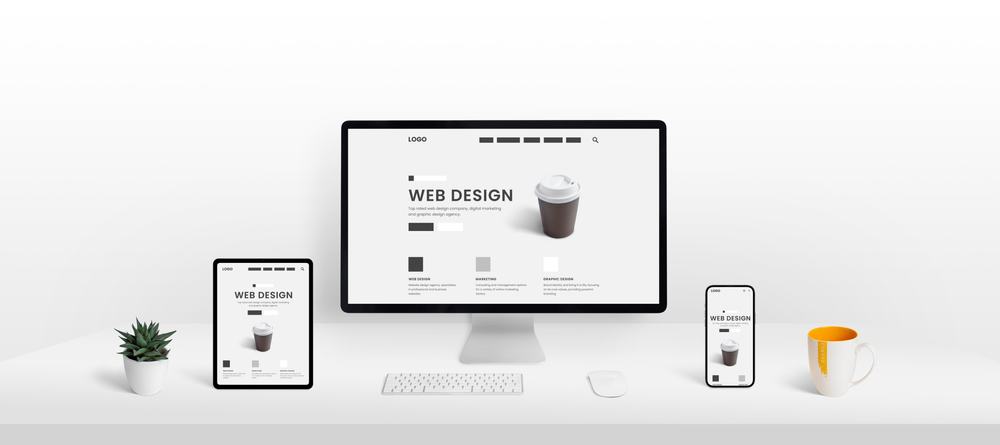One-page vs. Multi-page Website. Which is better? – That is the question.
Recently, I was approached by a potential client looking to improve their Local SEO visibility and reviews.
The prospect complained that they weren’t ranking well for any of the important keyword phrases in a local search.
As always, I proceeded to do a comprehensive audit of both his website and local visibility to see what areas they could focus on improving.
The first thing I noticed was that they had a one-page website. As soon as i saw this I was not surprised by their ranking struggles.
While one-page websites have many advantages over multi-page websites, depending on your business objectives and goals, it may be the wrong choice for you.
Choosing the right structure for your website requires careful consideration of various elements.
Web design and development professionals are aware that functionality and user experience play pivotal roles in website design.
Our discussion focuses on the factors affecting the decision to opt for either a one-page website or a multi-page layout, delving into the essence of what a one-page website entails.
Understanding the specifics of one-page websites is crucial as it influences how content is presented and interacted with by visitors.
It is important to evaluate how this format stacks up against traditional multi-page websites. Knowledge of their differences and benefits will guide individuals or businesses toward making an informed decision suited to their online presence needs.
Key Takeaways
- One-page websites offer a distinct way of presenting content, with all information on a single scrollable page.
- Comparing one-page and multi-page websites reveals notable differences in structure and user experience.
- The choice between one-page vs. multi-page website should be informed by the specific goals and needs of the user.
Understanding One-Page Websites

A one-page website consists solely of a single page where all content is immediately accessible upon entering the site.
Unlike multi-page websites, which use numerous pages to organize content, a one-page site centralizes all information in one place.
The idea is to enhance user experience through simplicity and a seamless flow of information.
- Simplicity: In a page-less design, navigation links redirect users to different sections within the same page rather than new pages.
- Content Structure: Critical to ensure that features and usability mirror that of multi-page sites, but all within a single scrollable page.
- Usability: With careful planning, a one-page site presents content in an organized, functional manner to avoid overwhelming the user.
Web development for single-page sites demands a strategic approach to layout and content integration. The focus is on streamlining the experience without sacrificing the site’s purpose and functionality.
When a one-page website starts to become overcrowded, it might indicate the need to transition to a multi-page format to retain usability and avoid deterring visitors.
Comparison of a One-Page vs. Multi-Page Website
SEO Implications for Single-Page and Multi-Page Websites
In the realm of SEO, multi-page websites hold an advantage due to their ability to incorporate a vast array of content and keywords.
This, in turn, can enhance indexing by search engines.
Though single-page websites present a sleek option, they often lack the extensive content required for optimal SEO.
The more expansive architecture of multi-page websites allows for a wider SEO strategy and increased opportunities for ranking across various search queries.
Best option: Multi-page websites, as they provide more content for search engines to index and more opportunities for optimization.
Conversion Effectiveness Between Website Structures
Conversions are critical, and both single-page and multi-page websites can be structured to guide users towards actions such as purchases or sign-ups.
Single-page websites streamline the journey to conversion with a direct narrative flow. In contrast, multi-page websites can accommodate more detailed information, which may be necessary for more complex services or products.
Best option: Dependent on the website’s objectives and the user’s requirements. Simpler offerings might thrive on a single-page, while complex services benefit from a multi-page structure.
Load Time Disparity in Website Formats
When considering load time, single-page websites typically load once, which might give them a speed advantage.
However, single-page websites that are feature-rich and heavy on content can suffer from longer load times due to the volume of content needing to load simultaneously.
Multi-page websites may introduce load times with each new page, but individual pages might load quicker due to less content per page.
Best option: Single-page websites often have faster overall access, but optimized multi-page websites can offer quick navigation between lighter, individual pages.
Design Aspects of a One-Page Vs. Multi-Page Website
Design considerations vary greatly between single-page and multi-page websites.
Single-page sites challenge designers to maintain elegance without overcrowding, while multi-page sites must ensure consistency and clarity across various pages.
High-quality design can be accomplished in both formats, but the decision often hinges on the quantity and type of content that needs to be presented.
Best option: Both formats can excel in design; the right choice is contingent on the content, functionality, and user experience goals of the website.
Navigational Ease Across Website Layouts
Navigation is a cornerstone of user experience.
Single-page websites can offer a straightforward, linear experience that can be particularly user-friendly. Alternatively, multi-page websites aim to implement intuitive navigation menus that allow users to quickly find the information they seek.
Best option: Single-page websites typically offer simpler navigation, while multi-page websites require a well-thought-out navigation structure for optimal use.
Mobile Experience: Single-Page and Multi-Page Website Performance
Mobile users often benefit from the streamlined nature of single-page websites, where ease of use and speed are prioritized. Conversely, multi-page websites can perform well on mobile devices too, but they may require additional optimization to ensure a smooth user experience.
Best option: Single-page websites generally provide a superior mobile experience due to their simplicity and speed.
Simplicity in One-Page Vs. Multi-Page Website Architectures
Simplicity can be a guiding principle for website design.
Single-page websites embody this principle by condensing content into a single, easy-to-navigate page.
Multi-page websites can also be designed with simplicity in mind, but they inherently contain more elements due to their structure.
Best option: Single-page websites typically prioritize simplicity, which can be particularly effective for delivering a focused message or content.
Optimal Website Structure: Single-Page vs Multi-Page for Your Objectives
| Feature | One-Page Website | Multi-Page Website | Best Option |
|---|---|---|---|
| SEO | Limited content for optimization | More content, better for SEO strategies | Multi-page |
| Conversions | Quick access to CTA | Detailed info for complex offerings | Depends on needs |
| Load Time | Overall faster, but content-heavy can slow down | Individual page loads can be quicker | Usually single-page |
| Design | Clean design but limited space | More room for creativity | Depends on needs |
| Navigation | Simplified user journey | Requires effective structure | Single-page |
| Mobile Experience | Often smoother and faster | Needs optimization for similar performance | Single-page |
| Simplicity | Less is more approach | Can be simple and elegant | Single-page |
Deciding on a single-page or multi-page website structure hinges on the content volume and the ultimate aim of your business. A one-page site may provide a seamless scroll for users with less content, while a multi-page layout is suited for more complex offerings, providing ample space for detailed information without overwhelming visitors.
Single-Page Advantages
- Simplified user experience
- Enhanced mobile navigation
Multi-Page Benefits
- Improved SEO outcomes
- Structured content for diverse target audiences
When evaluating a website’s layout, consider how each format aligns with your business goals. Does your service merit a dedicated page, or will a concise presentation captivate your audience? Choose a format that places your business in the most favorable spotlight.
If you’d like to further explore and discuss if a one-page vs. multi-page website design is the best fit for your business objectives, give the website design and development experts at LocalBizGuru a call today!
Common Questions
What are the Pros and Cons of a One-Page vs. Multi-Page Website?
Advantages of One-Page Websites:
- Streamlined User Experience: Users can easily navigate through content with a simple scroll.
- Mobile-Friendly Design: Typically performs well on smartphones where scrolling is intuitive.
- Simplified Storytelling: Allows for a cohesive brand narrative in a linear flow.
Disadvantages of One-Page Websites:
- Limited SEO Opportunities: Less content means fewer chances to rank for various keywords.
- Restricted Scalability: Can become cluttered as more content is added over time.
- Navigation Challenges: Users cannot bookmark specific content sections easily.
Advantages of Multi-Page Websites:
- Broader SEO Capacity: Each page can target a different keyword set, enhancing visibility.
- More Information: Accommodates comprehensive details about services, products, and company information.
- Enhanced Navigation: Users can quickly find information using menus and links.
Disadvantages of Multi-Page Websites:
- More Complex Design: Navigating through multiple pages can be more challenging for users.
- Increased Load Time: More pages can result in longer load times, affecting user experience.
- Potential for Overwhelming Users: Too many pages can confuse visitors, diluting the messaging.
What is The SEO Impact of a One-Page vs. Multi-Page Website?
- One-Page Websites:
Offer limited SEO opportunities as all content resides on a single page, making it hard to optimize for a variety of keywords. - Multi-Page Websites:
Allow for more extensive SEO strategies with multiple pages, each targeting specific keywords and topics.
Design Variations: Single-Page vs. Multi-Page
Single-Page:
- Design focuses on a linear narrative.
- Content is presented all on one page, often with distinct sections.
- Navigation typically involves anchor links that scroll to different page sections.
Multi-Page:
- Design accommodates complex structures and multiple themes.
- Content spread out across various pages and categories.
- Traditional navigation uses a menu to direct users to different pages.
Choosing Single-Page or Multi-Page
Opt for a Single-Page Website When:
- Presenting a concise portfolio or product.
- Seeking a mobile-first design that’s easy to navigate.
- Wanting to tell a story in a linear manner.
Choose a Multi-Page Website For:
- Offering detailed information across various topics.
- Planning for future scalability and content addition.
- Aiming for higher SEO performance with targeted keywords on multiple pages.
Comparing Functionality: One-Page vs. Multi-Page Website
While Single-Page Websites can incorporate interactive features, Multi-Page Websites are generally better suited for:
- Hosting complex functions, such as e-commerce platforms.
- Providing comprehensive user interfaces with advanced functionalities.
Which Format Offers a Better User Experience: Single-Page vs. Multi-Page?
Single-Page Websites:
- Tend to have a continuous flow, enhancing story-telling aspects.
- Can lead to a more consistent and controlled user experience.
Multi-Page Websites:
- Allow users to navigate directly to the information they seek.
- Often provide a more conventional browsing experience. It’s similar to reading a book with clearly labeled chapters.



